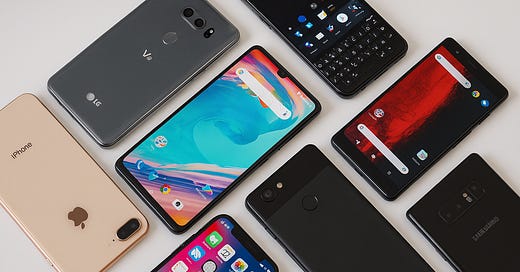AI and the End of Smartphones and the Internet
Artificial Intelligence and What Comes After the Internet
The internet, as all general-purpose technologies (GPT) do, has become so pervasive in our lives that it’s hard to imagine life without it. We have reorganized our societies, businesses, and in some ways, democratic processes around this GPT. Yet I believe we are now at the beginning of the end of our chapter with this technology as the central node in our societies. The rise of AI as a general-purpose technology, and AI agents that will be taking action on our behalf, means we could slowly move away from “humans” doing the “doing” on the web, and toward an agent-first web. This has myriad implications for the future.
Agents First
For the sake of framing out my thoughts, I am going to set aside forecasts on timelines. As it stands today, agents are incredibly unreliable outside of software engineering. So for now, let’s make the assumption that reliability, privacy, and data security are solved. (See my previous article on the ethical and security implications of agents: Should AI Agents Require a License)
In a world where I have teams of AI agents working on my behalf, my relationship with the internet—and how I would engage with it—changes dramatically. My agent pulls my usual orders from Amazon, books my Ubers, drafts and sends my communications, mostly in response to my voice commands. The browsing, clicking, and swiping that serve as our current interactive relationship with the technology start to disappear. Of course, there are circumstances when I will want to view, inspect, and double-check, such as before a high-stakes or luxury purchase (reviewing the flight, scoping out a wedding dress or an engagement ring), but that won’t resemble the current process of unlocking a device, booting up Safari, clicking, zooming in, and the whole nine yards. You could instead imagine the agent organizing all that needs to be reviewed ahead of time, so as soon as my device is opened, I review immediately.
I am specifically saying device because I believe smartphones will eventually go away. There are numerous datapoints to support this. Historically speaking, our communication infrastructure has always evolved: pay phones to home phones to pagers to flip phones to smartphones. There is no reason that evolution randomly ceases to continue. But perhaps most compellingly, we can see the investments by the biggest smartphone providers themselves, willing to cannibalize their own smartphone revenue (although smartphones are now in the cash cow quadrant), to bet on what’s next. Google and (reportedly) Apple seem to be going the way of smart glasses. OpenAI has teamed up with legendary iPhone designer Jony Ive for an AI-first device that may be entirely screen-free.
These two technologies—agents and communication devices—converge and reinforce one another. The less I need to be present on the internet, the less I need a device centered around humans taking action on the internet.
This new paradigm would have major implications for social media, for the precious data and histories we have built on the internet (archives will become vital), and for human connection. Although, there will likely be something that follows it.
So it’s not that the internet disappears entirely, it’s that it becomes less central for humans.
Our communication infrastructure has always evolved over time, and it’s near impossible to predict what exactly will come next. Famously, in 1992, Intel CEO Andy Grove declared “a computing device in every pocket” was nothing more than a pipe dream fueled by greed. Now many of us struggle to imagine life without this very device.
Whether it’s glasses, an amalgamation of wearables, or something as impossible as the iPhone, we are at the beginning of what comes next and the soft decline of what once felt permanent.




If technology evolves as you believe it will, what use will there be for humans? I'm not asking to be contrary. I'm truly concerned, and I think too few people are asking this question for fear of sounding alarmist. I read an article today on Axios about AI that argues that this technology could obliterate the white-collar workforce within the next year or two. I'd like to read something that balances the perceived benefits of AI with the likely reality that a large segment of the population will be left behind and their livelihoods destroyed.
now the challenge is going to be using our skills and transferring them to this new intangible interface. like for example a marketer in 1990would make infomercials and now in 2025 marketers for large brands are using social media